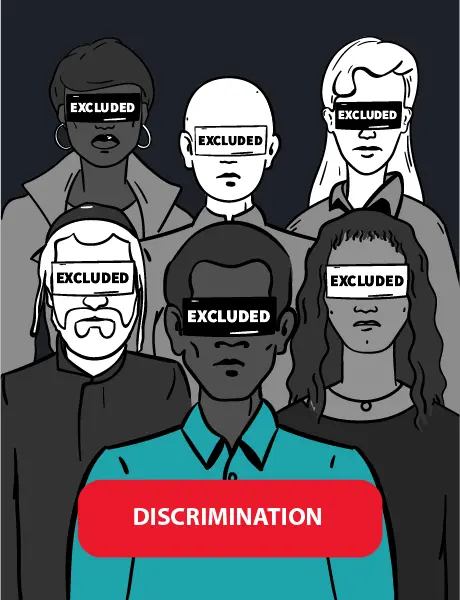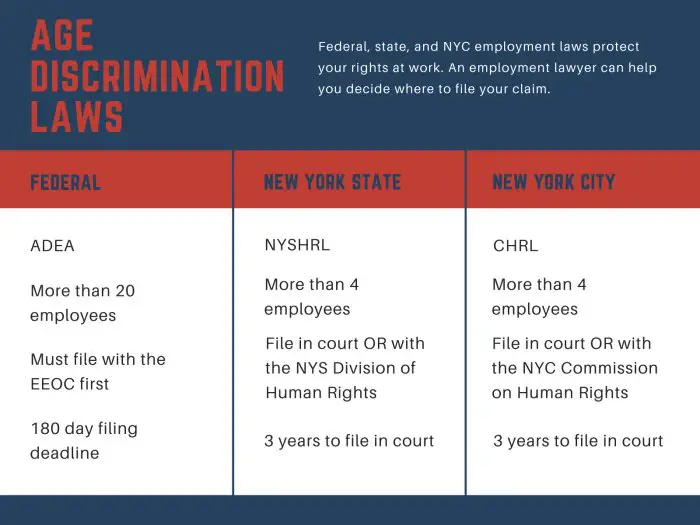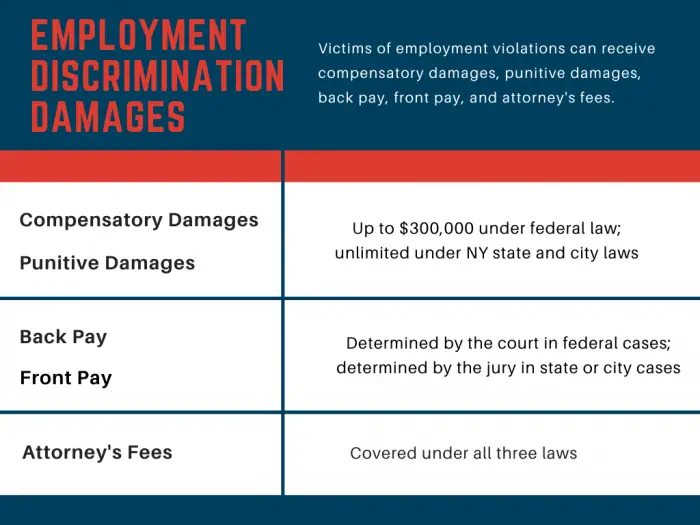Age Discrimination in the Workplace
Protect Your Rights with an Age Discrimination Attorney
Have you experienced age discrimination at work? Mistreating a job applicant or employee because of their age violates the law. While federal laws only apply to workers over the age of 40, New York state and city laws protect workers of all ages from discrimination.
Learn about your rights under age discrimination laws and how to prove age discrimination at work. If you experience age discrimination at work, an age discrimination attorney can help.
Contact New York discrimination lawyer Charles Joseph for a free consultation to protect your rights. Charles Joseph’s firm has recovered more than $140 million for clients. Reach out today for a free, confidential consultation.
Know Your Rights: What is Age Discrimination?
Age discrimination means treating someone unfavorably because of their age. It can include refusing to hire an older job applicant or firing someone because of their age.
It is illegal for an employer to make employment decisions based on your age.
Employers cannot make employment decisions based on your age instead of your skills or how well you do your job. This includes decisions about hiring, firing, discipline, distribution of benefits, promotion, compensation, job training, or any other condition of employment.
Young people can also be the victims of age discrimination.
While the federal ADEA only applies to workers over the age of 40, New York state and city laws apply to workers of all ages. Age discrimination can occur even if the perpetrator is over 40 or the same age as the victim.
If you have been the victim of illegal age discrimination, you have protections under federal, state, and New York City laws.
New York age discrimination laws cover non-employees.
The law does not just protect employees. After October 11, 2019, New York State’s discrimination laws expanded to cover non-employees, such as domestic workers, independent contractors, consultants, vendors, and subcontractors.
An age discrimination attorney can help you determine whether state discrimination laws cover you.
Have more questions about age discrimination? Check out our FAQ on What is Age Discrimination?
Age Discrimination in the Workplace Examples
Age discrimination in employment violates the law. This includes making employment decisions based on someone’s age, including refusing to hire a job applicant based on their age. There are several types of age discrimination that employees should know about.
Age-Based Employment Decisions
Employment decisions include hiring and firing. Federal, state, and New York City laws protect employees from age-based discrimination in employment decisions.
Age discrimination in the workplace examples:
- You apply for a job for which you have experience and excellent qualifications. The hiring committee chooses a much younger candidate because they believe he will be more committed to a full-time position because of his age.
- Your employer tells you that it is laying off you and several coworkers of a similar age due to company cutbacks and reorganization, while younger employees get to keep their jobs.
- You have several years of experience working in your current job as a receptionist, but your employer fires you because your boss says you look too old or sound old on the telephone.
Discriminatory Promotion Decisions
Laws against age discrimination also protect employees from not receiving promotions, including tenure.
Age discrimination in the workplace examples:
- After several years at the same company, you receive exemplary reviews and an employee-of-the-year award. Yet every time you apply for a promotion, the position is filled by an older employee with similar qualifications. When you complain, your boss says you look too young to be a manager.
- You have worked as a low-level manager at a company for years and have had excellent performance reviews. Your responsibilities have increased over time, but your job classification and salary do not reflect this. Your boss says that the company does not want to invest in you because you’re too close to retirement age.
- You are a teacher on a three-year tenure track with excellent performance evaluations. But your boss questions whether you can put in the necessary hours at work. He points out that you are significantly older than the other teachers up for tenure. As a result, you are denied tenure.
Policies With Discriminatory Effects
Unintentional age discrimination can also be illegal.
Job policies that appear neutral can be discriminatory. For this reason, policies cannot disproportionately harm workers based on age, unless the policy is job-related.
For example, a company cannot require that all prospective employees undergo a physical fitness test before being hired if being physically fit has nothing to do with the company’s business. The requirement must relate to carrying out the job.
However, employers can require a minimum level of experience for any position, as long as it is not tied to a specific age.
Age discrimination can occur regardless of the age of the victim or the perpetrator.
Hostile Work Environments Violate the Law
You can be the victim of age discrimination even outside of employment decisions. Age-based harassment can also create a hostile work environment.
Jokes, slurs, or offensive or derogatory remarks about people of a certain age can create a hostile work environment. Under state and city law, anyone over the age of 18 can be subject to age-based harassment. Federal law only applies to workers over the age of 40.
Hostile Conduct Must Be More than Trivial or Petty
New York City has a generous standard for a hostile work environment, which is defined as being treated less well than others because of your age as long as the poor treatment amounts to more than a “petty slight” or “trivial inconvenience.”
Federal law requires that the conduct be either severe or pervasive. New York State recently lowered its standard so that after October 11, 2019, it no longer requires that discriminatory harassment be severe or pervasive.
It is important to speak up when you witness offensive conduct to make it clear that such comments are unacceptable and unwelcome.
Victims Do Not Have To Be The Targets
It is a misconception that only the target of hostile comments can be the victim of a hostile work environment. You can be a victim even if you are not the person being targeted by the offensive behavior––and even if you are not a member of the targeted age.
If the offensive behavior is affecting your ability to do your job, you may have a claim.
The Offender Does Not Have To Be Your Boss
It is a misconception that only your boss can create a hostile work environment. Employers have a responsibility to prevent age discrimination. A co-worker, a supervisor in another area of the company, or even a non-employee, like a vendor, can be the perpetrator.
Check out our FAQ on Hostile Work Environments for more information.
How To Prove Age Discrimination In The Workplace
Age discrimination can happen in any workplace. If you are the victim of age discrimination or a hostile work environment, there are several steps you can take right away. Proving age discrimination means keeping good records and protecting your rights. A New York age discrimination attorney can help.
- Start keeping notes of the discriminatory practices and/or harassment. Be specific in your details—write down the time and place of each incident, what was said and done, and who witnessed the actions.
- Keep doing a good job. Make copies of your job evaluations and any letters or memos that show that you are doing a good job at work.
- Seek support from friends and family, clergy, and, if helpful, a mental health professional. Harassment at work can be very stressful, and it is a difficult thing to face alone.
- Report the incident in writing to your supervisor and human resources department. Tell them about the behavior and the steps you have taken to address it.
- Check your company’s employee handbook. If your employer has a harassment policy in place, follow it.
- Preserve any information such as inappropriate texts, pictures, or voicemails sent to you.
- Put all of your complaints in writing, and keep copies at home.
Proving age discrimination starts with knowing your rights. Keep good records and reach out to a New York age discrimination attorney for help. A lawyer can help you collect the evidence to make the strongest case.
Retaliation is Illegal
If you complain about age discrimination in the workplace, it is illegal for your employer to take any action against you.
In addition to protections for different types of age discrimination, the law also protects employees from retaliation.
It is illegal for employers to retaliate against anyone who:
- Complains about discrimination on the job
- Files a charge with the Equal Employment Opportunity Commission (EEOC) or any state or city agency
- Participates––including as a witness––in an employment discrimination proceeding, such as an investigation or lawsuit
You Are Protected From Retaliation Even If There Was No Discrimination
As long as you have a good faith and reasonable belief that discrimination or harassment occurred, your employer is barred from taking any action against you for speaking out or participating in any investigation or proceeding. It does not matter if an agency or court determines that there was no discrimination.
If you speak out about discrimination and harassment in your workplace, the law protects you from retaliation. Age discrimination lawyers can help protect your rights.
How to File a Claim For Age Discrimination
If you choose to file a claim for age discrimination, there are a number of options available. You can file a complaint with the U.S. Equal Employment Opportunity Commission (EEOC), which handles violations of federal law, or the New York State Division of Human Rights, which handles NYSHRL violations, or the New York City Commission on Human Rights, which is responsible for CHRL violations.
If your claim falls under multiple laws, the three agencies that handle discrimination claims have what is called a “work-sharing agreement.” This means they cooperate with each other to process your claims. There is no need to file a claim with each agency. You just need to indicate that you want your claim “cross-filed” with the other agencies.
Learn how to file a discrimination claim, how to file an EEOC complaint, or contact a New York age discrimination attorney for help.
Comparing Age Discrimination Laws
Legal Remedies for Age Discrimination
Victims of age discrimination in the workplace can recover damages, back pay, and fines from their employer. Contact a New York age discrimination lawyer to pursue your legal remedies.
- Back Pay: Back pay is the wages, bonuses, and benefits that workers lost because of discrimination. The courts can award back pay based on what you would have earned without the discrimination.
- Reinstatement: Courts can order your employer to rehire you or give you a promotion that you were denied because of age discrimination.
- Front Pay: Front pay compensates employees for lost wages and other money because of age discrimination. You can receive front pay equal to how much money you need to return to your position before the age discrimination.
- Compensatory Damages: Victims of discrimination receive compensatory damages based on their lost wages, the cost of finding a new job, and emotional pain and suffering. These are out-of-pocket expenses caused by the age discrimination.
- Punitive Damages: Punitive damages punish the employer for not stopping the discrimination. New York City’s law includes punitive damages for employers who were negligent, reckless, or consciously disregarded your rights.
- Liquidated Damages: Rather than providing compensatory or punitive damages, the ADEA includes liquidated damages. This is a monetary penalty equal to the amount of back pay owed.
- Attorneys’ Fees and Costs: If you successfully bring an age discrimination suit, the court can order your employer to cover your age discrimination attorneys fees and any court costs.
Potential Damages In An Age Discrimination Lawsuit
In addition to these damages, victims of age discrimination can also receive emotional distress damages.
Age discrimination attorneys help protect your rights. Reach out to Charles Joseph, a New York age discrimination attorney, for a free, confidential consultation today.



